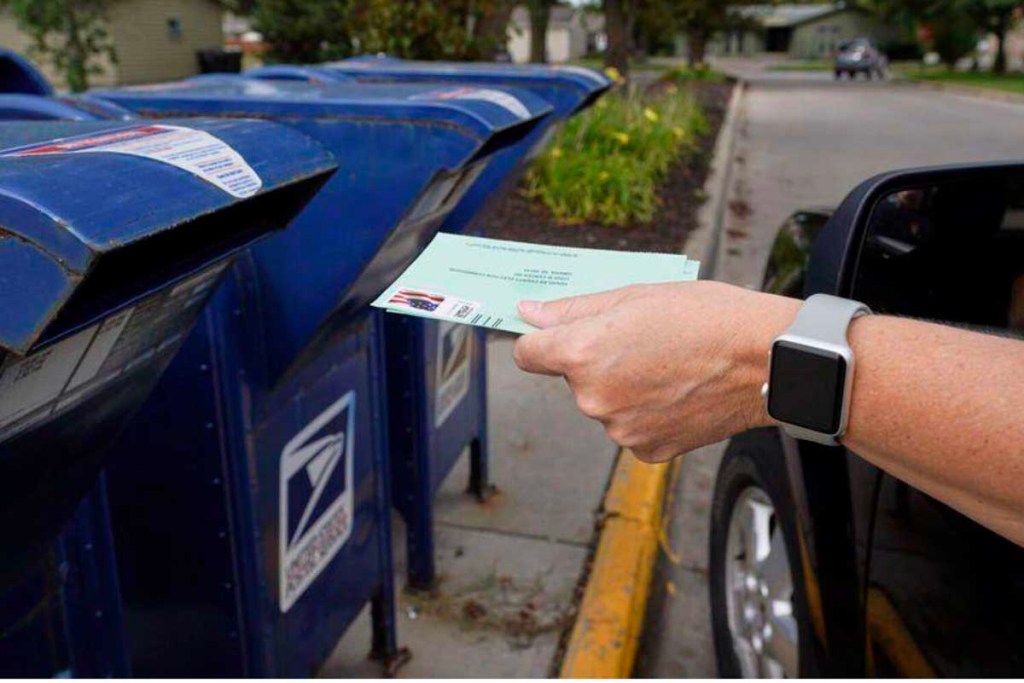Election board reviving push to end no-excuse absentee voting in Georgia
Published 10:32 pm Wednesday, January 3, 2024

- In this Tuesday, Aug. 18, 2020 file photo, a person drops applications for mail-in-ballots into a mail box in Omaha, Neb.
After an unsuccessful 2021 attempt by some Republican lawmakers to end no-excuse absentee voting, the Georgia Election Board is recommending limits for voting by mail.
The proposal, submitted by board member and Republican Party appointee Janice Johnston, asks state lawmakers to consider legislation ending or amending no-excuse absentee voting. No-excuse absentee voting allows voters to cast ballots by mail for any reason.
Trending
According to the State Election Board’s proposal, the board has received numerous complaints involving absentee ballot requests, duplicate voting by absentee ballot, failure to mail or deliver absentee ballots in a timely manner, defects in the handling process and recording of absentee ballots and the appearance of counterfeit absentee ballots, which has undermined “public faith and integrity of elections in Georgia.”
Georgia is one of nearly 30 states that gives voters the option to vote absentee-by-mail without an excuse and has allowed such for more than 15 years.
Under the board’s proposal, absentee voting would revert to pre-2009 requirements when only certain people were allowed to vote by mail, such as those who would be absent from their precinct during the elections, have a physical disability, or caregivers of someone with a disability.
Voters 75 years or older or voters required to remain on duty in their place of employment for the protection of the health, life or safety of the public would be allowed to vote by mail.
Republican lawmakers attempted to end no-excuse voting as part of the state’s election overhaul bill (SB 202) in 2021 following the contentious 2020 presidential election in which Democrat Joe Biden defeated incumbent Republican Donald Trump. Two Democrats also won the state’s U.S. Senate seats in runoffs following the 2020 general election.
Unfounded claims of voter fraud, largely related to mail-in ballots, spewed after the election, though audits and recounts confirmed results of the state’s elections.
“The perception of some people is that you lose chain-of-custody with that type of voting,” said University of Georgia Political Science Professor Trey Hood III. “If you go vote in person, the ballot never leaves the voter’s hands before it goes into the tabulator. With absentee-by-mail voting, it’s going through the mail or someone’s delivering it. So there’s no evidence, especially even for 2020 in Georgia or other states, that there was widespread fraud, but that’s the perception some people have.”
While other election-related changes tightening voter ID and absentee ballot rules were approved along party lines in 2021, proposals to end no-excuse mail-in voting were axed a week before the legislative session ended amid debate from voter advocacy groups and Democrats.
Joseph Kirk, elections supervisor in Bartow County, northwest of Atlanta, said administering and counting absentee ballots can stretch election staffs thin. However, SB 202 has provided means for election staff to lessen opportunities of fraud and errors with absentee ballots.
SB 202 allows election staff to begin counting ballots before Election Day. Before the enactment of SB 202, absentee ballot counting could only begin on Election Day.
“This helped us report results faster on election night,” Kirk said. “It’s helped take some pressure off of counties that had problems getting thousands and thousands of pieces of paper envelopes processed in a short amount of time and let them spread that operation out at a comfortable pace.”
Georgians broke records with 1.3 million ballots cast by absentee-by-mail amid the COVID-19 pandemic in 2020. However, many election officials said voting by mail has substantially declined to near pre-pandemic levels in subsequent years.
Kirk said it’s unlikely that a large number of voters will utilize absentee-by-mail voting as seen in 2020. In the 2022 mid-term elections, fewer than 205,000 mail-in ballots were cast in Georgia.
If droves of mail-in ballots are cast, Kirk said that election staffs should be equipped to dispel concerns of those who support doing away with no-excuse absentee voting via security and protocols that were approved in SB 202.
“I support any option we give the voters that’s safe and secure for them to pass their ballot and participate in the election,” he said. “Anything we can do to help encourage folks to vote or make it easier to vote is a good idea. and voting by mail is a service that we have provided to people who truly need it. Rather than trying to find the amount of fraud we’re OK with, why don’t we just work on having a safe process that everybody can use that wants to.”
Hood predicts that changing or doing away with no-excuse absentee voting would have a minimal affect on the outcome of most elections.
“I really don’t think it would impact things all that much because people that might really need to use an absentee-by-mail ballot because they’re elderly or disabled or those kinds of things still have that option,” he said. “There’s some small percentage of people who may really like to vote absentee-by-mail who wouldn’t fall into one of those excuse categories that would have to switch and vote either early in-person or in person on Election Day at the precinct.”
The state election board’s proposal will be open for public comment at its next business meeting, which is yet to be scheduled. The Georgia General Assembly’s 2024 legislative session starts Jan. 8.



